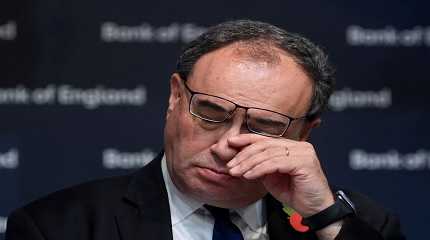
LONDON, Dec 13 (Reuters) - Governor Andrew Bailey spoke to reporters after the Bank of England said investment funds and other non-bank financial institutions would face their first 'stress test' after the near-meltdown in the pension fund sector earlier this year.
Below are comments from Bailey and colleagues from the BoE at a news conference.
BAILEY ON RISKS POSED BY NON-BANKS
"I think it's different now because ... we've now got a whole series of non-bank incidents, if you like, across different jurisdictions, and I think it is absolutely critical first of all to recognise that this is a sector that is highly internationally diversified."
BAILEY ON REGULATING NON-BANKS
"The FPC (Financial Policy Committee) obviously has to make choices over where it focuses on what is a very big landscape... In terms of following through, I'm not saying it necessarily requires a change to remit. I think it does require a change to focus... We have made a recommendation this time...and it goes to the area of defined-benefit pensions schemes and the pensions regulator. It is not saying we should change the perimeter but it is saying that I think we need more focus on what I call the financial aspects of regulation in that area."
BAILEY ON KEEPING REGULATION UP TO DATE
"It's not a matter of universal deregulation but rather getting regulations that suit our case. Post-financial crisis regulations have served an important purpose, the system is more robust, but the mere passage of time does not mean those regulations are no longer needed. Far from it. They should be kept relevant and amended as such but we should assume this time is different."
BAILEY ON POST-FINANCIAL CRISIS REFORMS
"I would...caution that the notion that we're past the financial crisis, and we therefore don't need the regulations that we had post the financial crisis, I would not go along with that view because I think we have to understand clearly why the banking system is much more robust today than it was then. And regulation isn't the only contributor to that, but it is an important part of that story."
BOE DEPUTY GOVERNOR SAM WOODS ON UK REGULATION AFTER BREXIT
"I think it is particularly important that here in the UK, having just left the EU, as the host of a very large global financial centre, we are seen to be a pragmatic but a robust implementer of the international standard because that's part of our licence to operate a very large financial centre."
WOODS ON POST-BREXIT JOB LOSSES IN UK FINANCE
"It was always clear that with passporting falling away as part of Brexit and various other changes, that our colleagues in the ECB would require more entities in the EU, and as part of that there would be some staffing implications. So that's always been, I think, priced in, at least certainly from our point of view. Our key interest has been in making sure that any changes that take place are based on proper regulatory concerns and are not a kind of land grab. And secondly that the new structures, which are of course a bit more complex than what we had before Brexit, can be overseen and also manage risks properly within the firms. And on both of those scores, I think we're fine... I'm really not concerned. The numbers we are talking about on traders remain a very small fraction of the trading population here in London."
BAILEY ON CRYPTO-CURRENCY RISKS FOR INVESTORS
"I've taken a pretty strong line on crypto...that it doesn't have intrinsic value and that if people wish to invest in it, they must be prepared to lose their money."




